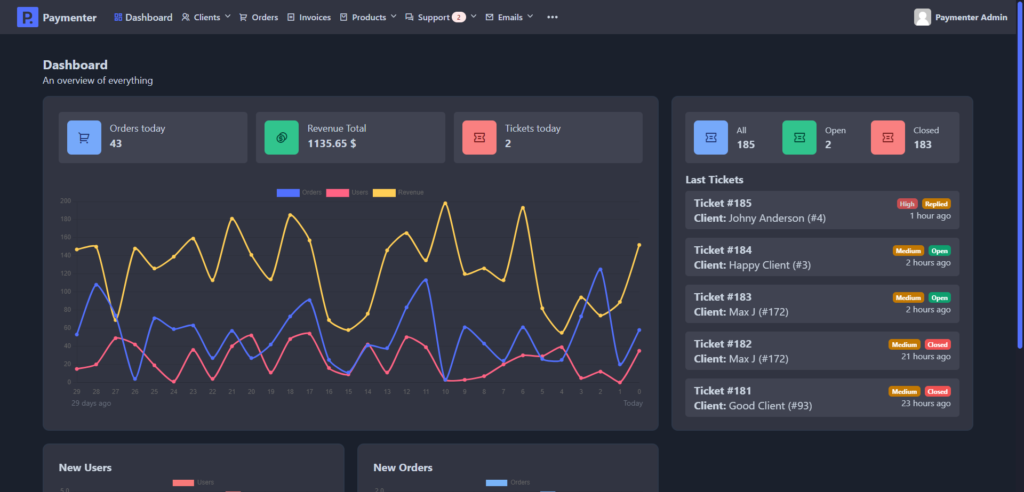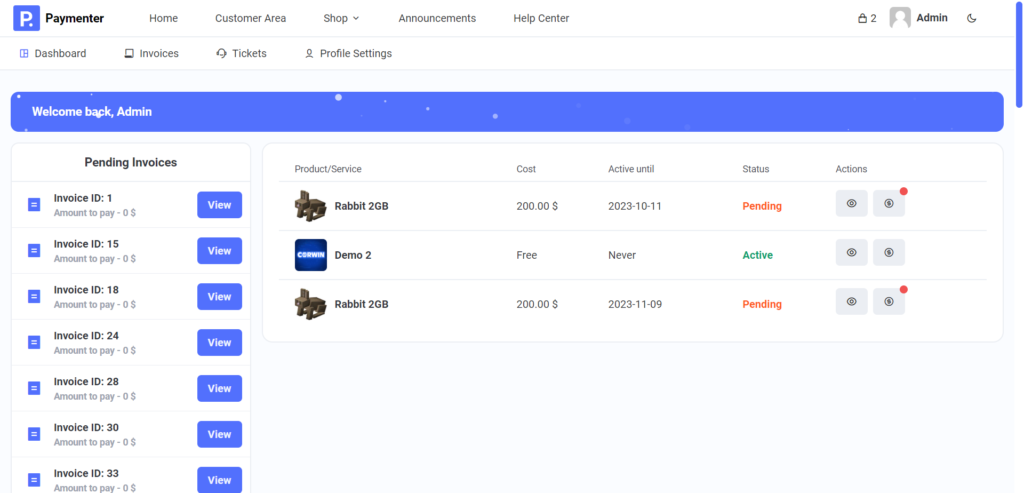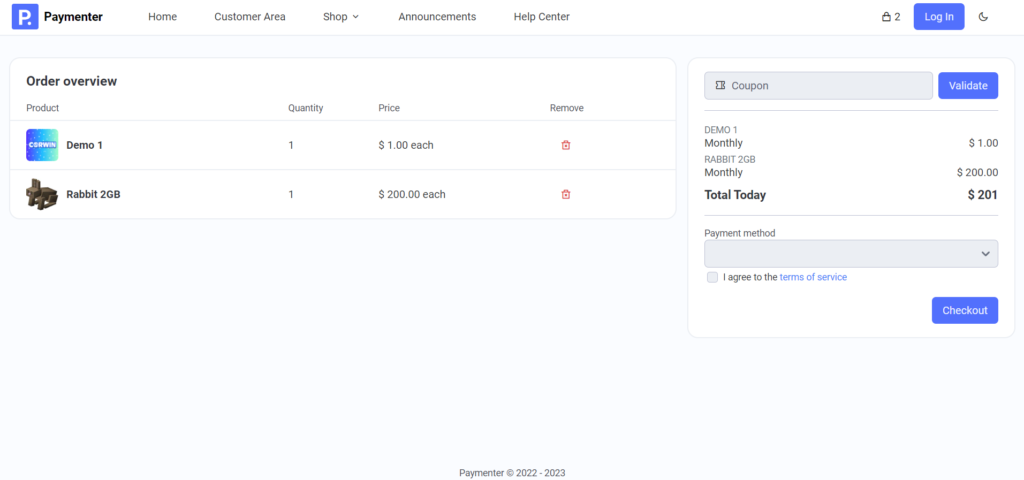For hosting providers, there aren’t many options available for billing solutions.
The important part is automating tasks based on payments and the ability to link all of the various tools required for a hosting provider together, such as VirtFusion, Stripe, PayPal, your emailing solution (AWS SES?), and beyond.
There are many moving parts for a hosting company, and the more you can automate, the better.
This is why simple solutions like WHMCS, ClientExec, Blesta, and HostBill have remained the only options available.
None of those options have really changed much in the last 10 years, either. It’s been a very stagnant market, begging for someone to come in and shake things up.
But the top dog of the host billing solution space is WHMCS by far, and second place isn’t even close.
WHMCS as a product has recently both essentially kicked off lifetime license owners and raised prices — all without adding any improvements to the product in years.
It makes sense why someone would want to create their own hosting billing solution; all of the options are questionable and are stuck in the early 2000s.
Thus, Paymenter is born…

What the admin interface of Paymenter looks like
What Is Paymenter?
Paymenter is an open-source host billing solution that integrates many of the tools you’d need as a hosting provider.
I only found out about them from this LowEndTalk thread, which wasn’t even a thread related to Paymenter. A user suggested a smaller hosting company that was using Paymenter, with a powered by link being contained in the footer.
It’s safe to say they’re still a relatively unknown product as of yet, so I decided to reach out to the founder Corwin, and ask him a couple of questions.
Thankfully, he was happy to oblige:
SirFoxy: “Corwin, how old is Paymenter?”
Corwin: “It just turned one year old.”
SirFoxy: “What gave you the idea for it?
Corwin: “I got the idea because there are many paid software solutions and none of them are fully free and open-source.”
SirFoxy: “What plans do you have for Paymenter?”
Corwin: “I have many plans for paymenter not limited to: taxes, subscriptions, advanced security system and much more.”
SirFoxy: “Do you have some form of monetization plan in place for it? Such as hosted solutions? Or any plans of the like?”
Corwin: “We have a PaaS plan where you get a hosted paymenter instance for $5/month, we also get 10% of marketplace paid extensions.”
SirFoxy: “Okay, gotcha. So there’s a way to sustainably continue the development of it in place. Especially once it grows a bit more. Do you see yourself as a real viable competitor to WHMCS?”
Corwin: “Yes, but as we much younger then WHMCS, we have still less features and stuff.”
SirFoxy: “What are the notable benefits of using Paymenter?”
Corwin: “Because its open-source you can edit EVERYTHING, that is the biggest benefit IMO.”
SirFoxy: “Gotcha. Anything else you’d like to mention?”
Corwin: “That the support of it is outstanding 😛 just write an honest review, instead of one from me.”
Fair point there Corwin, and I’ll take your advice.
Reviewing Paymenter
For this review, I’ll be dividing it up into three major sections.
Firstly, integrations, because being able to automate means being able to integrate. Secondly, ease of use, for both the admin and the client. And finally, security, stability, and longevity.
For each of these sections, I’ll be rating Paymenter out of 5 stars. Let’s dive in.
1) What Gateways and Tools Can You Integrate With Paymenter?
Natively, Paymenter integrates with the following payment gateways:
- Stripe
- Mollie
- PayPal
- Xendit
As well as integrating with the following hosting control panels:
- Pterodactyl
- Proxmox
- DirectAdmin
- VirtFusion
- Virtualizor
- CyberPanel
That covers a solid amount of integrations, but it’d be nice to see cPanel added on there as well.
The good news is they make it pretty easy for you to be able to create your own extensions if you view their documentation.
The verdict here?
⭐⭐⭐⭐★
2) How Easy Is Paymenter To Use? Does It Work Well?
It’s very easy to install; there are no major complaints there.
Once installed, the admin interface is relatively refreshing, especially once you compare it to the likes of Blesta:

What the Paymenter admin interface looks like
Plus, the client-side interface is clean, self-explanatory, and easy to use:

What the Paymenter client interface looks like
It also provides the normal functionality you’d expect for a hosting provider billing panel, like a help center, ticketing functionality, announcements, and more.
Altogether it looks very refreshing and is a welcoming level of simplicity, but you can tell there’s still some work to be done.
Again, I’m going to have to keep 4 out of 5 stars here.
⭐⭐⭐⭐★
3) Is Paymenter Secure? Can I Trust Building My Business on It?
The good news about the project being open-sourced is that you don’t have to trust Paymenter.
Trust yourself and look over the code here.
One of the biggest benefits of open-source projects is the fact exploits get found much faster than if the code was closed-source.
That said, as of yet, there have been no security concerns related to Paymenter, so I don’t see any reason to be concerned — just keep in mind it is a younger project without the time to reach full maturation, and that includes security as well.
With the monetization methods, Corwin is trying to roll out, there is a potential way sustainable development could continue on the project outside of open-source contributors, so, providing the project continues to keep developing and growing, it does seem like Paymenter could go on a run here.
But, to answer the question of can you trust building your business on it?
Sure, but, know that you’re somewhat of a beta tester, so, while it’s free, expect to be contributing your time or energy in some inevitable form or fashion.
My verdict here?
I’m rocking with 4 out of 5 stars across the board.
⭐⭐⭐⭐★
So, Is Paymenter a Viable Free WHMCS Alternative?
Yes and no.
If you’re starting from scratch and want an interesting new panel to test out, sure, go ahead.
But it’s not worth moving over to in its current state. WHMCs is definitely a far more mature project.
There’s a reason you’re paying WHMCS — and that’s peace of mind.
But that isn’t to say there isn’t a place for projects like Paymenter.
There certainly is, and given some more time for the project to mature, I think it could become a great competitor to WHMCS.
If you’re interested in supporting the project, there are four different ways you can do that:
- Sign up for Paymenter’s hosted option for $5 per month here.
- Contribute code to the project here.
- Financially sponsor the primary developer on GitHub here.
- Join the Discord here.























I personally use Paymenter and it’s awesome project, need little more work but pretty much it’s stable.
At a minimum, they need to integrate Authorize.net. Preferably, they connect with something like AlignPay as well.
Stripe and PayPal are notoriously unreliable for anyone who dares offend the Democrat Party in the United States.
Mollie does not appear to service the United States. Neither does Xendit.
So, any American with public political opinions contrary to the most malicious elements of our society is going to have a problem with this application.
The Authorize.net API is well documented and while I don’t have specific numbers, I can say that it is well integrated with many hosting and e-commerce solutions.
Authorize.net acts as the payment gateway under which the vendor can have any number of other “payment providers” or underwriters actually dealing with the billing. Importantly, they show a staggering lack of interest when activists call them on the phone complaining, and thus the lowlife deplatformer is compelled to buy from the vendor and do some actual homework before they can start whining to somebody who will actually listen to them.
CyberPanel and Proxmox support is nice. I’m unfamiliar with Proxmox but upon first glance it has appeal. I have recently become something of a CyberPanel enthusiast.
Would be nice to integrate Webmin/Virtualmin/Cloudmin.
Thanks for the review.
Does anyone know if paymenter has any sort of DOMAIN management functionality?